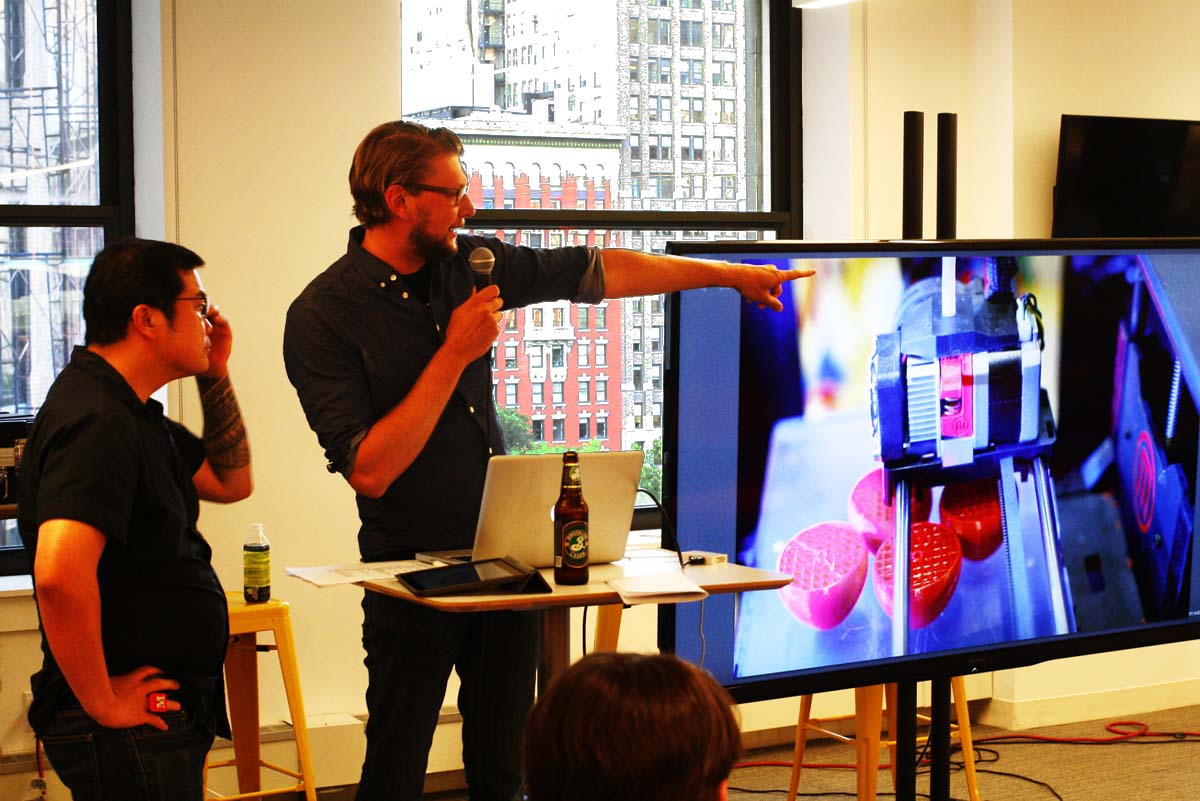At an event at BuzzFeed’s Manhattan offices late last month, MakerBot explained why a 3D printing company would build a mobile app: To get people using their new 3D printers right away. Think of it as a not-awful user’s manual. Sometimes your own imagination doesn’t kick in until someone walks you through it.
That’s what the mobile devs at MakerBot came to the NYC Apps meetup to discuss. Joining them was Tinybop, the educational children’s app company that has two apps out now, and a third on the way.
Here are our takeaways from each talk.
###
Andrew Askedall, MakerBot’s art director for digital production, and Manny Tan, director of consumer UX (both pictured above), presented on the company’s mobile efforts.
The team wanted to give new owners of MakerBot’s least expensive model, the MakerBot Replicator Mini, some fun projects they could make right away. The emphasis here is ease for the customer, but with enough intuitive customizations that the user still feels like his or her first objects are their own.
“Starting a print was not as easy as you’d expect,” Tan said of first-time users of the company’s additive manufacturing machines.
To that end, they created MakerBot PrintShop, one of three free iOS apps from the company. PrintShop lets you make type (a big 3D sign where the words explode out from a base), custom bracelets, custom rings or a select set of the most fun projects in Thingiverse, the company’s platform for sharing schematics for prints.
With the PrintShop app, many steps that veterans of 3D printing go through are boiled down for first-time users. MakerBot has also launched a developer program. If the company digs what you build, it may promote it and also give you discounts on MakerBot products. The company launched the program with Modio, which Askedall described as a “WYSIWYG action figure app.”
###

Rob Blackwood, senior iOS engineer at Tinybop, at NYC Apps. (Photo by Brady Dale)
Rob Blackwood, Tinybop’s senior iOS engineer, described the hidden tricks of how the company makes its fascinating apps for kids, The Human Body and Plants.
The apps are educational digital toys.
They give kids organisms and spaces to explore, where kids can take action on the environment and see what happens — whether it’s feeding a virtual body too much ice cream or moving a prey animal right next to its natural predator.
- Physics play a huge role in Tinybop’s games. By programming in physics, the design team doesn’t have to do frame-by-frame animation. Instead, they can create digital objects that move in response to virtual forces in realistic ways. Much of this, Blackwood said, is powered by the Chipmunk engine.
- For much of Tinybop’s animations, the company takes illustrations from its artists, breaks them into parts, sets those parts atop digital skeletons and tells the app to move them around based on 2D physics.
- Within each environment, there’s a series of motivations, conditions and randomness that governs how creatures behave in those environments (and how they react to stimulus from the user). This comes down to system dynamics, which is at the heart of how Tinybop’s apps work.
- The company has been using Cocos 2D to build its games, but it’s looking at Unity for its next creation (which means Tinybop will be moving into 3D).
- Keep an eye on the company: it hopes to release some assets as open source soon, so that other developers can play with them.
- Both apps have ways for kids to load in questions that parents can review later, in order to discuss with the kids. “I find with my kids the real learning comes from prompting questions,” Raul Gutierrez, the company’s founder, said, chiming in from the audience.
- Gutierrez also chimed in on a question about how much data the apps keep about what users do with them. Blackwood said, “None, so nothing.” Gutierrez added, “I have a theory that parents don’t want their kids to be tracked.”
Tinybop is starting to put together its third offering, but don’t look for that till next year. The company is actively looking for Unity engineers right now. It’s also constantly looking for good illustrators. “We are looking for really beautiful stuff,” Blackwood said. “Maybe a little bit weird stuff.”
Before you go...
Please consider supporting Technical.ly to keep our independent journalism strong. Unlike most business-focused media outlets, we don’t have a paywall. Instead, we count on your personal and organizational support.
Join our growing Slack community
Join 5,000 tech professionals and entrepreneurs in our community Slack today!
